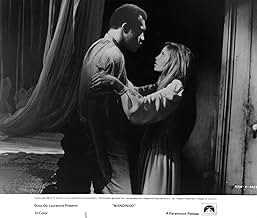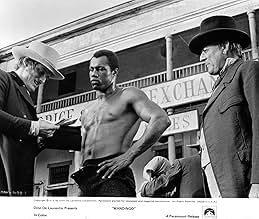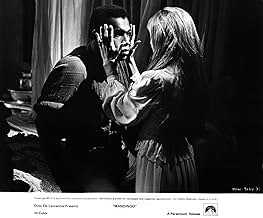NOTE IMDb
6,5/10
4,5 k
MA NOTE
Un propriétaire d'esclaves dans les années 1840 fait suivre à l'un de ses esclaves une formation de combattant à mains nues.Un propriétaire d'esclaves dans les années 1840 fait suivre à l'un de ses esclaves une formation de combattant à mains nues.Un propriétaire d'esclaves dans les années 1840 fait suivre à l'un de ses esclaves une formation de combattant à mains nues.
- Réalisation
- Scénario
- Casting principal
- Récompenses
- 1 victoire au total
Debbi Morgan
- Dite
- (as Debbie Morgan)
Avis à la une
This film, despite some controversy about it's biracial sex scenes when it was initially released, seems to have faded from memory. Given the degree of sex, violence, and unadulterated exploitation of slavery in the antebellum South, that's a surprise, because I saw this flick nearly ten years ago and STILL can't forget it! Those whose image of the old South has forever been defined by GONE WITH THE WIND as romantic and chivalrous and pick up this movie in the video store(the cover art on the box resembles that famous pose with Gable and Leigh)thinking they're about to be trasported to Tara ought to run like Hell! James Mason and his lame son Perry King live on a plantation and own slaves body and soul. Well, at least the body part, as we see when Mason strings an errant slave upside down, strips him, and pattles his butt with a perforated paddle. Son King takes a more tender approach, as he sleeps with the female slaves, especially Brenda Sykes, whom he takes as his mistress. However, he marries Susan George to provide an heir, and presents her with a ruby choker. He also gives Sykes the matching earrings. When George learns of the relationship(Sykes wears the earrings while she serves dinner to George and King on their first night at the plantation), and Kings learns George has slept with her brother, the marriage hits the skids. George drowns her sorrows in lots of sherry and lots of Ken Norton, a slave Perry has purchased specifically for fighting other slaves for betting. George becomes pregnant, and when the baby comes, it hits the fan! It's hard to believe that anyone in 1975 could see this film as anything but exploitation of a very dark period in American history. Didn't anyone cringe at the sight of King going in to "take pleasure" from a female slave in a bed and the woman groans, "I too black for you", or Ken Norton standing stoically on the auction block of a slave sale while an old woman gropes around inside his loincloth? The video edition of this film I saw was from the early eighties, when movie studios did their transfers from the first worn-out prints the could grab, and may have had a muddy, faded look because of this, but it's hard to believe this thing came from a major studio. You'd certainly wouldn't know it from the production values, because the film looks as if the filmmakers didn't spend a penny more than they had to(we're treated to interior scenes inside a plantation house curiously devoid of furniture). With all these setbacks, it's hard to understand why this movie hasn't garnered even a semi-cult following. If you're in the mood to be offended on all levels and don't treasure some romanticized Hollywood image of the old South, grab MANDINGO.
This movie is a disturbing look at the realities of the antebellum South. And yes, I do believe the depictions and events in this movie are realistic. Such atrocities are well-documented. Both the movie and the book contain graphic violence, sex, and rape. The movie is sometimes difficult to watch, but it's worth watching, for anyone who ponders the evils of humanity and especially the history of the U.S. during the 1800's. The acting and film quality aren't upper echelon. The dialogue is sometimes excessively histrionic. But that's not what's so good about this movie. It's gritty, realistic, and brutally honest.
As I watched, I realized that maybe things haven't changed so much since those times. Racism and sexism are still very much alive. You can easily compare the attitudes and behaviors depicted in this film with things that go on in our society today. Some people have commented that Blanche was "oversexed". I find that a rather hilarious statement. They obviously don't get the feminist subplot of this movie. The way it depicts and breaks down racism and sexism and shows exactly why they're faulted ideologies is why I love this movie so much!
As I watched, I realized that maybe things haven't changed so much since those times. Racism and sexism are still very much alive. You can easily compare the attitudes and behaviors depicted in this film with things that go on in our society today. Some people have commented that Blanche was "oversexed". I find that a rather hilarious statement. They obviously don't get the feminist subplot of this movie. The way it depicts and breaks down racism and sexism and shows exactly why they're faulted ideologies is why I love this movie so much!
Quentin Tarantino has called Mandingo one of the few big budget exploitation films Hollywood has ever produced, and you can definitely see a lot of this film in his Django Unchained. I'm not sure I'd go as far as calling this an exploitation film, but it's certainly startling at times and deals with the subject of slavery without backtalk or ambiguity.
The movie takes place in Deep South prior to the American Civil War. Slavery is at its highest bloom and it's just as bad as you've probably heard. First night rights are freely exercised, slaves are just one step above animals, sold like cattle and while they're not beaten daily – they still need to work, and it's not like you beat your cows daily, either – it doesn't take much for them to incur the wrath of their masters.
The movie is also notable in that it uses the term 'mandingo' somewhat correctly. The term referred to any slave of the highest quality and not just to those who fought against one another. Though even that fighting might be a myth. The movie tells the tale of one particular manor, its owners and the pair of mandingo slave that were brought there, one of them to be trained as a fighter.
It's a tough movie to sit through if you're squeamish and while it's not overly gluttonous in its depictions of violence, like Django Unchained is, it doesn't shy away from them either or pull its punches. A very good movie to check out if you liked Django and/or are looking for a darker historical piece.
The movie takes place in Deep South prior to the American Civil War. Slavery is at its highest bloom and it's just as bad as you've probably heard. First night rights are freely exercised, slaves are just one step above animals, sold like cattle and while they're not beaten daily – they still need to work, and it's not like you beat your cows daily, either – it doesn't take much for them to incur the wrath of their masters.
The movie is also notable in that it uses the term 'mandingo' somewhat correctly. The term referred to any slave of the highest quality and not just to those who fought against one another. Though even that fighting might be a myth. The movie tells the tale of one particular manor, its owners and the pair of mandingo slave that were brought there, one of them to be trained as a fighter.
It's a tough movie to sit through if you're squeamish and while it's not overly gluttonous in its depictions of violence, like Django Unchained is, it doesn't shy away from them either or pull its punches. A very good movie to check out if you liked Django and/or are looking for a darker historical piece.
Mandingo seems to divide it's audience strongly between love and hate and that's not really surprising; the film features some real nasty elements and the way that it's all done with a highly quality 'period drama' sort of style means that it will likely miss it's supposed intended audience - although it seems to have found a good fan base among exploitation fans. The film is liable to shock modern audience for its racial themes and strong racial tone; it didn't bother me all that much to be honest as it suits the film within it's context and helps to enforce its exploitative nature, which in turn makes Mandingo more powerful. The film takes place in the south of America during the 1840's and the main focus of the plot is on slavery. White farm owner Hammond Maxwell one day discovers the fighting talent of one of his black slaves and soon decides to toughen him up for battle with other slaves. He's sympathetic with his slaves and soon becomes affectionate with one of the women, which doesn't sit well with his wife Blanche who, for revenge, forces the top fighter to sleep with her.
Anyone going into this film expecting a serious look at slavery will be either disappointed or annoyed (maybe both), but if you go into it expecting some nasty exploitation, you might find a lot to like. The film gives an unflinching look at a more primitive society and it actually more shocking for its tone and implications than the events that take place in it (although the film does include plenty of racism, torture and rape scenes). The way that the film depicts the black slaves as animals makes for uncomfortable viewing and the way that society was segregated into 'white masters' and 'black slaves' is always enforced on the viewer. The performances sit better with the exploitation side of the film rather than the serious drama side as none of them are particularly brilliant; although the three leads do fit into their roles well. Overall, this is clearly not a film for everyone and I'm not in any way saying that the film's bad reputation is in any way undeserved; but Mandingo is certainly an interesting film and I would say it is at least worth seeing.
Anyone going into this film expecting a serious look at slavery will be either disappointed or annoyed (maybe both), but if you go into it expecting some nasty exploitation, you might find a lot to like. The film gives an unflinching look at a more primitive society and it actually more shocking for its tone and implications than the events that take place in it (although the film does include plenty of racism, torture and rape scenes). The way that the film depicts the black slaves as animals makes for uncomfortable viewing and the way that society was segregated into 'white masters' and 'black slaves' is always enforced on the viewer. The performances sit better with the exploitation side of the film rather than the serious drama side as none of them are particularly brilliant; although the three leads do fit into their roles well. Overall, this is clearly not a film for everyone and I'm not in any way saying that the film's bad reputation is in any way undeserved; but Mandingo is certainly an interesting film and I would say it is at least worth seeing.
This film is not for the faint of heart, this film is for hardcore truth viewers who aren't squeamish, the film may be dated but the essence is truthful & too the point, this film should be "Mandatory" for students taking a U.S. or African American history course.
Le saviez-vous
- AnecdotesJames Mason admitted in interviews that he only made the film to make his alimony payments.
- GaffesDuring Mede's first fight in the city, he and his opponent are wrestling on the grass. When they roll over on the floor, the grass moves like a slipping carpet would, revealing it to be a sheet of artificial green, probably lying on the floor of a sound stage.
- Versions alternativesThe international version of the film (released on PAL region 2 DVD) contains a different cut of the film that runs approx. 5 minutes shorter than the U.S. release but also has many scenes presented in alternate clothed takes. In all 12 scenes were either trimmed or re-edited with alternate shots/angles/takes:
- Scene where slave is bent over and inspected for hemorrhoids is cut.
- Scene where the wench is being prepared for her deflowering is presented in an alternate take where her breasts are not exposed.
- Scene with pregnant wench is shot with alternate angles to obscure nudity. Perry King's full frontal nudity is cut and replaced with a closer shot that reveals he is wearing shorts when he kneels down to pray (It looks like a goof - only a bit of the waistband can be seen at the corner of the frame).
- Alternate takes of the slave being strung up to be beaten are used to obscure nudity, and many shots of him being beat and left bloody are cut.
- A few seconds where Perry King's cousin rips off a wench's dress and bends her over to begin beating her is cut to remove nudity. The beating is left intact.
- The slave market scene is edited to remove the topless wenches on display, and the shot where the German widow sticks her hand into Ken Norton's shorts and "inspects" him is cut short. The second shot with her hand in and then removing it is left intact though.
- An alternate take is used with a prostitute clothed rather than nude at the bawdy house.
- A few seconds of a prostitute rubbing on Perry King's crotch is cut.
- An alternate take is used during the fight at the bawdy house so that a prostitute is seen holding her dress up while she cheers whereas in the original she lets it fall and her breasts be exposed.
- The entire scene between Perry King and Brenda Sykes in which she asks him if he'll let their child go free is presented in alternate clothed takes. In the original film they are both completely nude. Even the camera angles and setups are the same, only with clothes in the international version.
- In the scene where Ken Norton fights a man to death one long shot where the other fighter claws his back is cut. Also cut is when Ken bites down on the other fighter's neck, is pulled off, and then bites into his neck again. All the close-ups are cut.
- The Susan George/Ken Norton love scene is almost entirely missing. Ken Norton's nudity is cut, and then the scene ends in an alternate take when the two go out of frame onto the bed. The original scene went on for much longer and exposed Ken Norton's buttocks and Susan George's breasts. The German theatrical version does not feature any of these alterations and is identical to the U.S. release.
- ConnexionsFeatured in Sooner or Later (1979)
- Bandes originalesBorn in This Time
Music by Maurice Jarre
Lyrics by Hitide Harris (as Hi Tide Harris)
Sung by Muddy Waters
[Played during opening title and credits]
Meilleurs choix
Connectez-vous pour évaluer et suivre la liste de favoris afin de recevoir des recommandations personnalisées
Détails
- Date de sortie
- Pays d’origine
- Langues
- Aussi connu sous le nom de
- Bitmeyen Kavga
- Lieux de tournage
- Sociétés de production
- Voir plus de crédits d'entreprise sur IMDbPro
Box-office
- Montant brut aux États-Unis et au Canada
- 2 433 010 $US
- Durée
- 2h 7min(127 min)
- Mixage
- Rapport de forme
- 1.85 : 1
Contribuer à cette page
Suggérer une modification ou ajouter du contenu manquant























